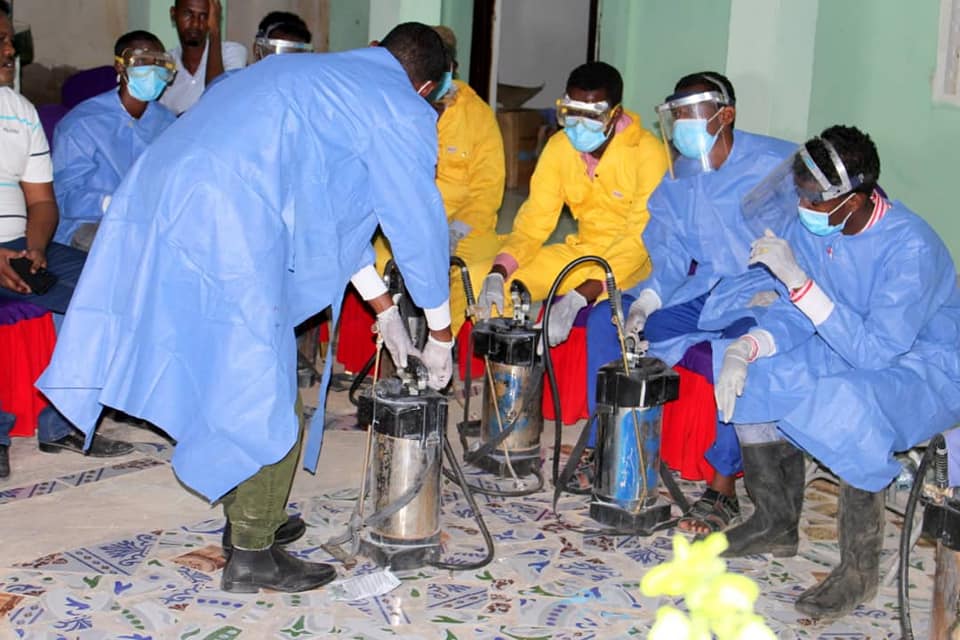
Somalia struggles and unable respond effectively to COVID-19 pandemic

MOGADISHU (HORN OBSERVER) The number of confirmed COVID-19 cases continues to rise in Somalia, as do the associated deaths attributed to the disease. As the cases rise in number, the health systems in Somalia are facing rapidly increasing demand for patient care for COVID-19.
On Saturday, the Federal Ministry of Health reported 73 new cases bringing the total confirmed cases across the country at 1357 and 55 fatalities.
When health systems are strained and overwhelmed, especially in fragile and vulnerable settings as in Somalia where availability of mechanical ventilators is very limited and other critical care support for patient care is basic or absent, deaths from the COVID-19 outbreak may increase substantially over time.
Given the scale and nature of the COVID-19 crisis and the immense media attention it has received, there will be growing demand and political pressure to reduce direct mortality from the outbreak. In such a situation, essential health services, including life-saving services, tend to be disrupted and all health care resources, for example, essential supplies and health personnel, are redirected in order to reduce deaths from the outbreak.
This is also exactly the type of situation where the importance of maintaining other life-saving health services during an outbreak may be forgotten, and the need for essential health care, especially for mothers, children and other vulnerable groups, may be overshadowed by headlining figures of deaths from the outbreak. It is possible that if virus transmission of this coronavirus cannot be slowed down quickly in Somalia, the surge in COVID-19 cases and the increasing demand for care will put such enormous pressure on the fragile health system that it may reach breaking point.
Protecting health gains
Over the years, the country’s health sector has had many successes. For example, the country has remained free of wild polio virus since 2014, which has been helped by a time-sensitive and active surveillance system for acute flaccid paralysis throughout the country, including environmental surveillance. If these polio activities are not maintained, even during this COVID-19 crisis, we might see a resurgence of polio virus and a reversal of all the gains made over the years to end polio in the country.
The cholera outbreak continues to rage. Any disruption of essential care and other key health interventions for managing cholera and other infectious disease threats such as measles may lead to an upsurge in cases and excess deaths.
Maintaining routine immunization services for childhood diseases is another key challenge, especially with requirements for physical distancing in place. However, efforts are underway to support health facilities deliver immunization services while at the same time maintaining physical distancing. In a country where one child in every 10 children does not receive life-saving vaccines, the suspension or breakdown of routine immunization services will have a devastating effect on the lives of vulnerable children in the country. Any disruption to routine immunization services will be a severe setback to the WHO country office’s strategy to make every child count in its health programme.
Maintaining essential health care will be critical
Working in partnership with other United Nations (UN) agencies such as the United Nations Children’s Fund (UNICEF), United Nations Population Fund (UNFPA), International Organization for Migration (IOM), UNHCR the UN Refugee Agency, and the United Nations World Food Programme (WFP), the WHO Somalia country office is supporting the health authorities to constantly improve and maintain the essential health services for mothers, women, children, people with disability and elderly people especially those in camps for internally displaced people and refugees, while also managing the extra demand on health services caused by COVID-19.
Primary health care centres, which are the bedrock of essential health care in Somalia, have been supported with personal protective equipment for the health care workers managing these centres as an incentive to keep the centres open. At the same time, we are working to make sure that the health care workers have the training and knowledge to carry out triaging for COVID-19 for high-risk patients and refer them to higher facilities, while maintaining their routine health care services.
In the current situation with COVID-19, where caseloads are increasing and pressure is mounting on the health systems, the capacity to maintain routine service delivery in addition to managing the increased demand for care of COVID-19 patients needs to be ensured at any cost to protect the health gains achieved over the years. The WHO country office is working to support health service capacity through strategic shifts to ensure that increasingly limited resources provide maximum bene t for the population.
"While there is a need to fight this coronavirus on all fronts, we also need to ensure that essential health services that directly affect health and save lives are also maintained even during a crisis of this scale. Our gains in protecting children against vaccine-preventable diseases, our victory in eradicating polio virus from the country, our focus on leaving no one behind through universal health coverage will be lost forever if we cannot make difficult decisions to balance the overwhelming demand to respond to COVID-19, while simultaneously engaging in coordinated action to maintain essential health service delivery, and to prevent health systems from collapse,"Dr Mamunur Rahman Malik, WHO Country Representative for Somalia said.
Leave a comment
- Popular
- Rated
- Commented
04/11/2021 - 11:05:02
12/03/2023 - 22:58:08
22/01/2023 - 11:24:06
13/12/2015 - 09:27:08
01/03/2021 - 09:00:37
Opinions
17/04/2024 - 22:46:39
08/03/2024 - 02:04:01
Politics
17/04/2024 - 22:46:39
13/04/2024 - 04:52:30
Terror Watch
09/04/2024 - 12:24:06
25/03/2024 - 02:02:25
Press Releases
18/04/2024 - 21:29:03
13/04/2024 - 10:40:06
 0
0 


































Somalia struggles and unable respond effectively to COVID-19 pandemic
MOGADISHU (HORN OBSERVER) The number of confirmed COVID-19 cases continues to rise in Somalia, as do the associated deaths attributed to the disease. As the cases rise in number, the health systems in Somalia are facing rapidly increasing demand for